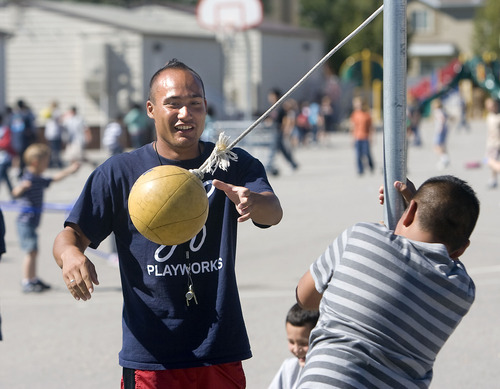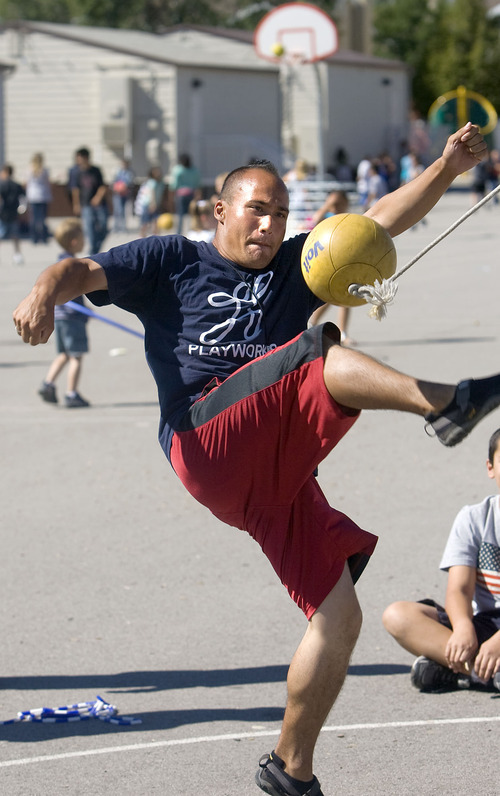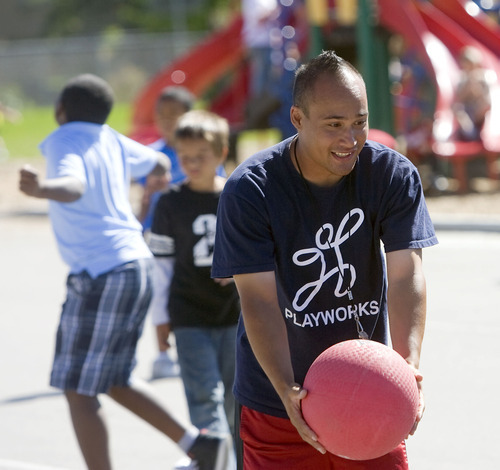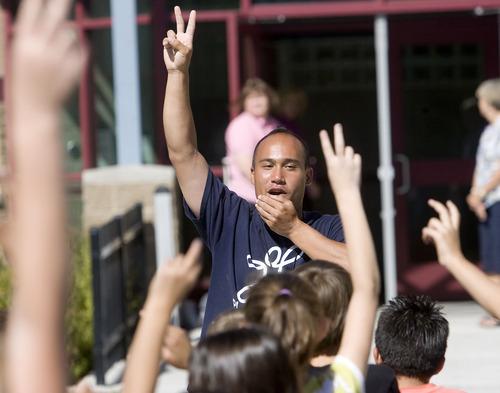This is an archived article that was published on sltrib.com in 2011, and information in the article may be outdated. It is provided only for personal research purposes and may not be reprinted.
It's a well-worn joke: What's your favorite subject in school?
The answer: Recess!
At Heartland Elementary, the classic one-word punch line isn't such a stretch this year. The West Jordan school has made recess more educational, thanks to a California-based Playworks program that provides a full-time coach to lead games and tournaments during the school's two recesses each day.
Heartland principal Aaron Ichimura latched onto the program after a one-week demonstration last spring.
"I really appreciated how many of our students were actively involved in activity," he said, instead of merely "biding their time."
Heartland and four other Salt Lake County schools — Meadowlark, Lincoln, Stansbury and Hillsdale elementaries — now have enrolled in the program. The cost: $55,000 a year. Playworks provides half the money through fundraising. Schools pay the other half.
For Ichimura, the program is well worth the sum.
Each day, Heartland students receive two breaks from the classroom: a 15-minute morning recess and a 40-minute lunch. In the past, both recesses have been a breeding ground for bullying and conflicts. Many of those problems are brought back into the classroom, where they result in students being sent to the principal's office for disciplinary reasons.
With Heartland's Playworks program coordinator, Timmik Yindeepit, taking charge on the playground, the principal already is seeing fewer "office referrals."
In addition to leading games, Yindeepit runs tournaments. Last week, he hosted a "soccer tetherball" tournament. It's a game he invented in which players cannot use their hands — legs and heads only — when striking the tetherball.
"I've always loved playing outside," Yindeepit said. "I was always an active child. It's really awesome to be able to do that every day."
During any given recess, Yindeepit might oversee students playing several sports across the playground. Children aren't forced to participate — if they just want to play on the swings, that's fine. But, with Playworks, there's always the option to get involved.
Yindeepit teaches kids the rules of games and about the importance of fair play and being physically active. If conflicts arise, he teaches students to use Playworks' Roshambo (rock-paper-scissors) method to solve problems. It's simple: If you win at Roshambo, you win the argument. Instead of wasting the 15-minute recess arguing over, say, if the foursquare ball was in or out, the issue is resolved quickly and the game continues. Students are encouraged to use Roshambo to solve conflicts inside the school walls as well.
Yindeepit's job goes beyond recess. He also visits each classroom about once a week to play games and teach kids about sportsmanship. With a coach running class for an hour, teachers are able to give one-on-one tutoring to students who may need extra help with math or literacy. Yindeepit also runs a "junior coach" program in which older kids learn to be leaders at recess, facilitate games and help resolve conflicts. After school, he teams up with the Boys and Girls Club to run Heartland's after-school program.
Playworks — now a fixture at 320 schools in 18 states and Washington, D.C. — has become popular in low-income schools such as Heartland, where 57 percent of students qualify for free or reduced lunch and 20 percent are learning English as a second language.
Chris Conard, a former Playworks coach who now oversees Utah's programs, says principals across the nation have seen positive results from Playworks.
"Recess is the hardest time of the day because that's when bullying happens the most," Conard said. "Fighting goes on and sometimes kids are not engaged. Kids are taking that back to the classroom and it is having a negative impact on learning. … If we place a full-time person at the school, they can create an environment to get [students'] energy out in a positive way, and then they can be more focused to go back into the classroom to learn."
After just one month at Heartland, Ichimura said he's already seeing results. The number of students visiting his office for disciplinary reasons was 22 percent lower in September than the year before.









